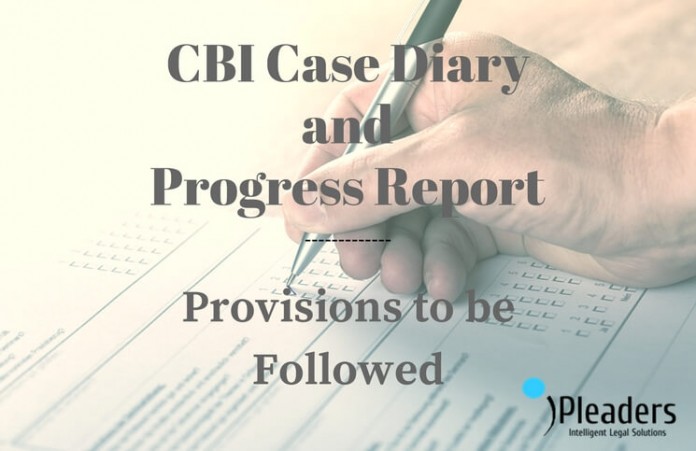As per section 172 of the Criminal Procedure Code, every Investigating Officer has to maintain a record of the work done during each day while the process of investigation is going on. This should be so done in a Case Diary and the entries must conform to a prescribed form mentioned in the Criminal Procedure Code.
Such diaries can be asked for by the courts during the trial of the persons being investigated. However, a Case diary can not be used as evidence. The information so provided can only be used as an aid for the ongoing trial.
Even those officers, to whom only a part of the investigation is entrusted (for example, if due to some issues, a subordinate officer is sent to investigate the crime scene), then such officers also need to maintain a Case Diary for a part of the case being investigated by him. Such diaries will be termed As “Supplementary Case Diary(ies)”.
These have to be taken into the record by the Chief Investigating officers who may or may not incorporate the gist of important facts unearthed by him in these investigations, for his own Case Diary.
All the case diary(ies) so prepared in a case should be properly dated and numbered consecutively.
Details To Be Mentioned In The Case Diary
The case diary is supposed to be maintained as a daily record of investigative actions carried out by the Investigating officers while working on a case. It should begin with the details of the time and the date at which the investigation begin.
As the process progresses, details about the places investigated, the persons interrogated and the documents seized should be incorporated into the diary. It should also contain a statement of the facts and the circumstances surrounding the case.
Since the case diary mainly deals with the investigative process, the entries into the diary must only relate to actual steps taken by the officers during the investigation of the case. Nothing that does not aid in the solving of the case should be added to the diary.
Thus, particulars of-
- The actual steps taken,
- The present and past addresses of the accused and witnesses,
- The statements made by them and so on should invariably be included in the case diaries.
The following should be avoided-
- Opinion of Investigating Officer, opinion of the Supervisory Officers and Law Officers.
- Any conflict of opinion between I.O., Law Officers, SP, DIG and Head Office.
- Recommendations made in concluding report of the I.O., comments of Law Officer(s) and Supervisory Officers.
- Any other facts/circumstances not relating to the investigation of the case.
Each Investigating Officer has to maintain a separate case diary for each date- prepared in duplicate- one copy of which will be retained by the Investigating Officer- in his case file- and the other copy will be forwarded to the Superintendent of Police to be scrutinized by him and to be retained in the office file.
Both copies of the case diary(ies) are required to include all the relevant enclosures, viz. copies of statements of witnesses, seizure memos, search lists etc. but may not include the day-to-day correspondence taken up by the I.O. with various offices/agencies/ individuals.
These case diary(ies) should be submitted to the Superintendents of Police every day for the purpose of scrutiny. The case diary(ies) are to be scrutinized and used for preparing further strategies and making new orders. It may also be utilized to make a periodical progress report.
Last Case Diary
After the investigation has been completed, the Investigating officer receives orders from the competent authority to write a Last Case Diary. The Case diary should include:
- In cases, in which charge-sheet is to be submitted to the Court, the last Case Diary would be written on the date of filing the charge-sheet.
If, however, investigation is continued under Section 173(8) Cr.P.C. on the same allegation or on other allegations, then Case Diary(ies) would continue to be written till such investigation is completed.
- For cases, in which prosecution is not launched, the last Case Diary would be written on the date when the competent Court passes the closure order on the Final Report under Section 173 Cr.P.C.
Progress Reports
Progress Reports are important monitoring tools which provide them an opportunity to assess the progress made in the course of the investigation. This helps them take a stock of the current situation and allows them to form strategies and provide further orders to the officers working on the case.
The aforementioned progress report should be prepared by the Superintendent of Police in accordance with the information provided to him by the Investigating Officers through the Case Diary(ies) maintained by them. The progress Reports should be serially numbered and prepared in the prescribed format.
Relevant CRIMES module may also be used to prepare and transmit these Progress Reports.
Progress Report on the ongoing inquiry/ investigation should be sent to the Director In General in all Preliminary Enquiries and Real Cases which are registered after obtaining orders of the Director In General or the Head Office.
In the cases, which have been registered with the approval of Joint Director and above, the DIG will forward the Progress Reports to the Joint Directors with their comments and directions issued to the Superintendent of Police.
Besides the above, where specific instructions are issued or where investigation continues beyond one year, in any case, the Progress Report would be sent to the Director In General. The Director-In-General would forward the Progress Reports to the Joint Director with his specific comments and directions given to the Superintendent of Police, if the investigation continues beyond one year.
The Joint Director or the Head Office may call for Progress Reports in any case and at any time.
How To Make Progress Reports
The progress reports should be made in the following manner:
- The first Progress Report shall indicate the specific allegation(s) made in the registration report or First Information Report on which the enquiries/investigation are to be conducted. It will incorporate the plan of action as approved by the Superintendent of Police and the time schedule to complete the enquiry/ investigation.
- The second progress reports should only mention the allegations in a brief and concise manner. They mainly aim at informing the authorities concerned of the results and developments in the case in respect to each and every allegation, separately. The gist of evidence collected by the examining witnesses (including the opinion of the Government Examiner of Questioned Documents or some other Technical Expert) and gathered by way of documents seized may also be mentioned for appreciating the developments in enquiry/investigation.
- It is mandatory for each progress Report to contain a gist of the investigative activities concluded that day and to enclose a chronological statement of important developments in the investigation till date. Apart from summarizing the evidence on each allegation, the PR should make mention of the discovery of new facts or evidence collected during the period under review and reflect the appreciation and supervision exercised by the Superintendent of Police.
- In the case of matters regarding disproportionate assets, the SSP should furnish the details such as savings at the beginning of check period, progressive calculation of income, expenditure, likely savings and assets computed based on the investigation conducted till the date of Progress Report. These statements should commence from the second Progress Report and in any case not later than fourth Progress Report on wards.
- The details to be provided can be divided into four main parts:
- ‘Statement A’ should contain details of movable and immovable assets at the beginning of the check period with dates of their acquisition. These would broadly include cash balance, bank balance, jewelry, household effects and other movable and immovable properties.
- ‘Statement B’ should contain the details of verified movable and immovable assets acquired by the public servant either in his name or held on his behalf, during the check period. The value of assets should be based on the purchase price, supported by documentary or other credible evidence, at the time of their acquisition.
- ‘Statement C’ will contain the progressive total income during the check period. This statement may contain figures in respect of income under different heads, e.g.; pay and allowances, rental income; income from interest, loans and advances, dividends etc., If necessary, schedules may be prepared and attached to the statement incorporating details under each head of income.
- ‘Statement D’ will contain Progressive expenditure during the check period. Statement C (−) D will provide the likely savings during the check period.
These progressive Reports should be sent to by the concerned authorities for as long as the investigation of the case is ongoing. The progressive reports will only stop once the case has been stopped by preparing a charge-sheet or by filing a closure report in the Court.
This’s all about CBI Case Diary And Progress Report for now. Did you find this post useful? Let us know in the comments section below. Don’t forget to Share!
 Serato DJ Crack 2025Serato DJ PRO Crack
Serato DJ Crack 2025Serato DJ PRO Crack










 Allow notifications
Allow notifications



[…] of a personal property, the investigating Officer must record the reasons for doing so in his case diary and must obtain the permission of the Competent Authority. Furthermore, as a general rule, in such […]